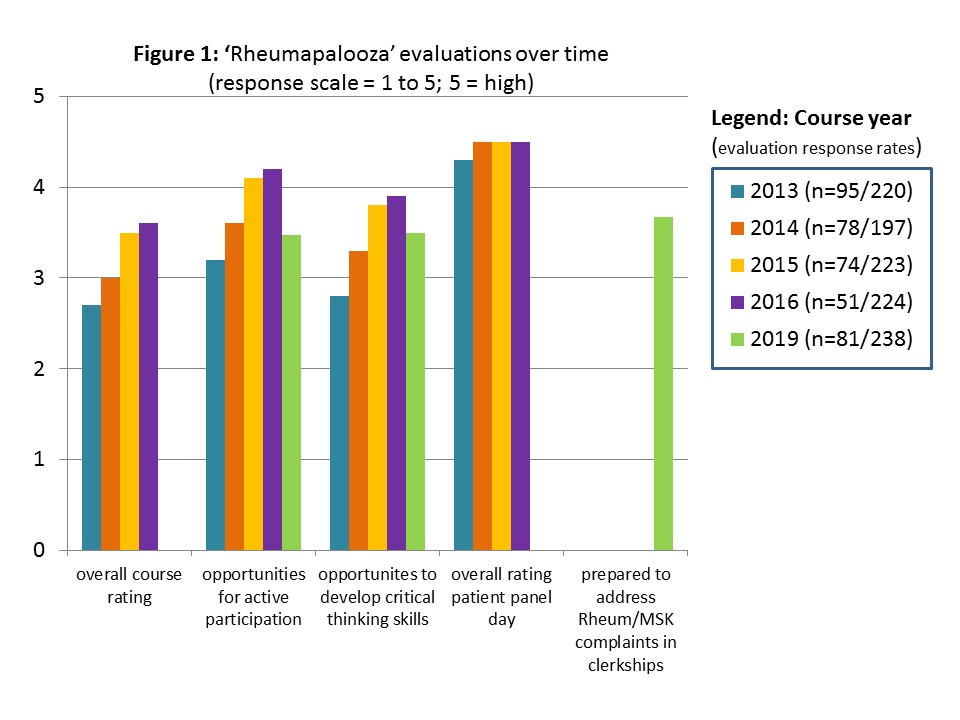Session Information
Date: Monday, November 9, 2020
Session Type: Poster Session D
Session Time: 9:00AM-11:00AM
Background/Purpose: The original Rheumapalooza course was a required, independent 12 hour curriculum for pre-clinical medical students in the UWSOM from 2010 – 20161,2. In 2015, the UWSOM implemented a new organ-based, flipped-classroom curriculum for entering students. Pre-clinical coursework was condensed from 24 to 18 months. In the new ‘Foundations’ curriculum students are divided between 6 regional campuses across five states (WA, WY, AK, MT, ID) for instruction. Site autonomy in delivery methods is encouraged, however course objectives, learning opportunities and assessments must be uniform. These changes presented new educational challenges for the delivery of rheumatology content.
Methods: Rheumatology components are now taught throughout disparate courses including immunology and musculoskeletal blocks. After Foundations, preclinical students enter a 3 month distance learning course to prepare for the USMLE Step exam and to transition to required clerkships. A 5 session day of basic rheumatology content was developed as part of the final week and implemented in 2018. ‘Remote Rheumapalooza’ was adapted from previous course content: Introduction to Medical Decision Making, Developing Approach to Musculoskeletal Complaints, MSK radiology, Case Based Rheumatology and Rheumatology Patient Panel. Sessions were offered in a webinar format via ZOOM to allow synchronous student participation across the region. Attendance was on a ‘selective’ basis; students were required to attend a minimum number of hours during the week. Session evaluations were required to claim credit for participation and allowed tracking of virtual attendance. Based on positive feedback, ‘Remote Rheumapalooza’ was offered again in winter 2019. In March 2020, the COVID-19 pandemic led to closure of all UW campuses and recorded sessions from 2019 were re-utilized for distance learning.
Results: Student attendance at one or more Rheumatology sessions in 2019 was relatively high (range: 67-146/238). Individual sessions were rated ‘useful and practical’ (mean rating: 4.3-4.6; 1-5 Likert Scale). Comparison to parallel evaluation questions from the historical course indicated comparable ratings, with perhaps a loss in ‘opportunities for active participation’ (Figure1). Qualitative feedback highlighted the importance of hearing the patients’ stories and observing how physicians interacted with patients. Some students requested more general musculoskeletal review and less detailed rheumatology content.
Conclusion: Implementation of a 5 hour webinar format ‘Remote Rheumapalooza’ was associated with high student attendance and comparable student ratings to the prior in-person course. Replication of the ‘tour’ of patient panel physical findings was most challenging from an educational design standpoint, however, students still found value in hearing patients’ stories via webinar. This work has important ramifications given increasing reliance on distance learning. Additional work is needed to enhance active participation in virtual sessions and to evaluate retention of concepts during clerkships.
- Emery H, Gardner G. [abstract]. Arthritis Rheum 2010;62 Suppl 10.
- Hayward K, Emery H. [abstract]. Arthritis Rheum 2017; 69 Suppl 4.
 Rheumapalooza Course Evaluations Over Time
Rheumapalooza Course Evaluations Over Time
To cite this abstract in AMA style:
Hayward K, Kiefer M, Emery H. Remote Rheumapalooza: Reboot of a Foundational Rheumatology Curriculum for Pre-Clinical Medical Students in the Era of Virtual Learning [abstract]. Arthritis Rheumatol. 2020; 72 (suppl 10). https://acrabstracts.org/abstract/remote-rheumapalooza-reboot-of-a-foundational-rheumatology-curriculum-for-pre-clinical-medical-students-in-the-era-of-virtual-learning/. Accessed .« Back to ACR Convergence 2020
ACR Meeting Abstracts - https://acrabstracts.org/abstract/remote-rheumapalooza-reboot-of-a-foundational-rheumatology-curriculum-for-pre-clinical-medical-students-in-the-era-of-virtual-learning/
